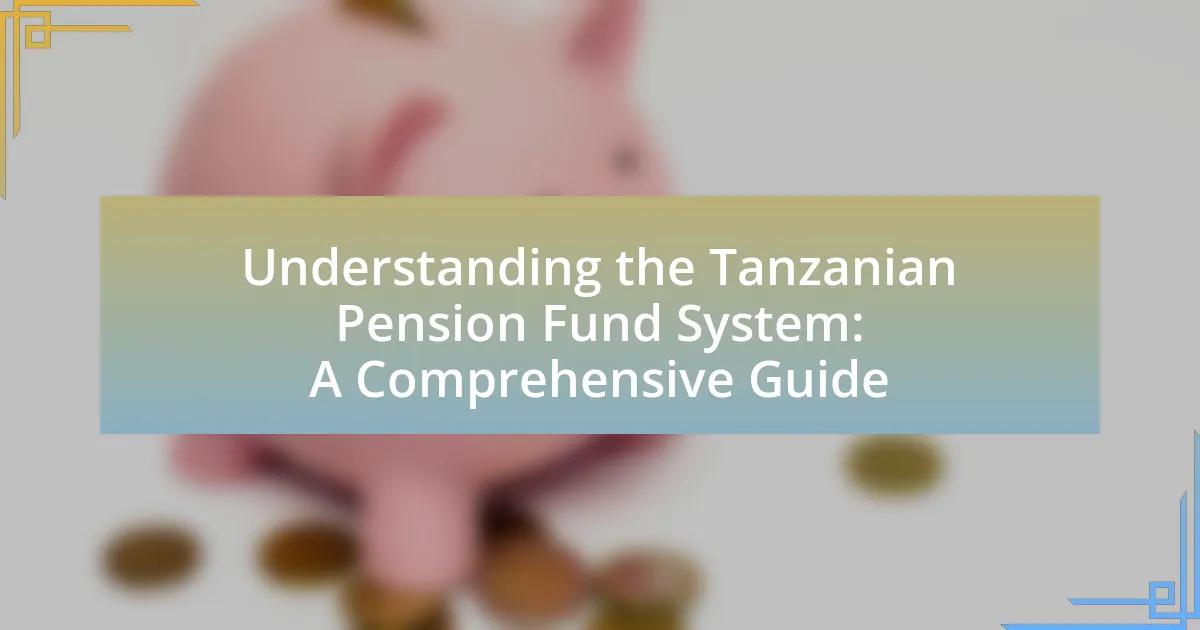The Tanzanian Pension Fund is governed by the Pension Act of 2012, which outlines the rights and responsibilities of its members. Members have the right to receive retirement benefits, access information about their contributions, and nominate beneficiaries, while their responsibilities include making regular contributions and providing accurate personal information. The article explores how these rights influence member participation and fund performance, the mechanisms in place to protect member rights, and the impact of member responsibilities on the sustainability of the pension fund. It also highlights best practices for members to effectively fulfill their rights and responsibilities, ensuring the overall health of the pension system.

What are Member Rights and Responsibilities within the Tanzanian Pension Fund?
Member rights within the Tanzanian Pension Fund include the right to receive benefits upon retirement, access to information regarding their pension contributions, and the ability to nominate beneficiaries. Responsibilities of members involve making regular contributions to the fund, providing accurate personal information, and adhering to the fund’s regulations. These rights and responsibilities are outlined in the Pension Act of 2012, which governs the operations of pension funds in Tanzania, ensuring that members are informed and compliant with the necessary requirements for their pension benefits.
How do member rights influence participation in the pension fund?
Member rights significantly influence participation in the pension fund by empowering individuals to make informed decisions regarding their contributions and benefits. When members are aware of their rights, such as the right to access information about fund performance and the right to receive benefits upon retirement, they are more likely to engage actively in the pension scheme. Research indicates that informed members tend to contribute more consistently, as they understand the long-term benefits of their participation. For instance, a study by the International Labour Organization highlights that transparency in member rights correlates with increased participation rates in pension schemes across various countries, including Tanzania. This demonstrates that clear communication of rights fosters trust and encourages members to take an active role in their pension fund participation.
What specific rights do members have under the Tanzanian Pension Fund?
Members of the Tanzanian Pension Fund have specific rights that include the right to receive benefits upon retirement, the right to access information regarding their pension contributions and benefits, and the right to nominate beneficiaries. These rights ensure that members can secure their financial future and make informed decisions about their pensions. Additionally, members are entitled to receive annual statements detailing their contributions and accrued benefits, which reinforces transparency and accountability within the fund.
How can members exercise their rights effectively?
Members can exercise their rights effectively by understanding the regulations governing the Tanzanian Pension Fund and actively participating in decision-making processes. This includes familiarizing themselves with the Pension Act and the fund’s policies, which outline their entitlements and responsibilities. Engaging in member meetings, utilizing available communication channels, and seeking assistance from member representatives or legal advisors further empower members to advocate for their rights. Evidence of effective member engagement can be seen in increased participation rates in pension fund elections and consultations, which lead to more representative decision-making.
What responsibilities do members have towards the pension fund?
Members have the responsibility to contribute regularly to the pension fund as stipulated by Tanzanian pension regulations. This obligation ensures the sustainability and growth of the fund, allowing for future benefits to be paid out to members upon retirement. Additionally, members must provide accurate personal information and promptly update any changes to ensure proper record-keeping and benefit calculations. Failure to meet these responsibilities can lead to penalties or reduced benefits, highlighting the importance of compliance with the fund’s requirements.
What are the key responsibilities outlined for members?
Members of the Tanzanian Pension Fund are primarily responsible for making regular contributions to their pension accounts. This obligation ensures that they accumulate sufficient funds for retirement. Additionally, members must provide accurate personal information and promptly update any changes to maintain the integrity of their accounts. Compliance with the fund’s regulations and guidelines is also essential, as it facilitates smooth operations and benefits distribution. These responsibilities are crucial for the sustainability and effectiveness of the pension system, ensuring that members receive their entitled benefits upon retirement.
How do these responsibilities impact the sustainability of the pension fund?
The responsibilities of members within the Tanzanian Pension Fund significantly impact the sustainability of the fund by ensuring that contributions are made consistently and that members are informed about their rights and obligations. When members fulfill their responsibilities, such as timely contributions and adherence to fund regulations, it enhances the fund’s financial stability and ability to meet future obligations. For instance, a study by the International Labour Organization indicates that regular contributions from members are crucial for maintaining the liquidity and solvency of pension funds, which directly correlates with their long-term sustainability.

How does the Tanzanian Pension Fund ensure member rights are protected?
The Tanzanian Pension Fund ensures member rights are protected through a combination of regulatory frameworks, transparency measures, and member engagement initiatives. The fund operates under the National Social Security Fund Act, which mandates the protection of member contributions and benefits. Additionally, the fund implements regular audits and publishes financial statements to maintain transparency, allowing members to track their contributions and benefits. Member engagement is further enhanced through educational programs that inform members of their rights and responsibilities, ensuring they are aware of the protections available to them.
What mechanisms are in place for safeguarding member rights?
The mechanisms in place for safeguarding member rights within the Tanzanian Pension Fund include regulatory frameworks, member education programs, and grievance redress systems. The regulatory frameworks, established by the National Social Security Fund (NSSF) and the Pension Act, ensure compliance with laws that protect members’ contributions and benefits. Member education programs inform individuals about their rights and responsibilities, enhancing awareness and participation. Grievance redress systems provide a structured process for members to voice concerns and seek resolutions, ensuring accountability and transparency in fund management. These mechanisms collectively work to uphold the rights of members and ensure their interests are protected.
How does the fund address grievances related to member rights?
The fund addresses grievances related to member rights through a structured complaint resolution process. This process allows members to formally submit grievances regarding their rights, ensuring that each complaint is documented and reviewed by designated personnel. The fund also provides clear guidelines on how members can escalate their grievances if they are not satisfied with the initial response, which includes access to an independent review board. This approach is supported by the fund’s commitment to transparency and accountability, as evidenced by regular reporting on grievance outcomes and member satisfaction surveys.
What role do regulatory bodies play in protecting member rights?
Regulatory bodies play a crucial role in protecting member rights within the Tanzanian Pension Fund by establishing and enforcing rules that ensure fair treatment and transparency. These bodies, such as the Pension Fund Regulatory Authority, oversee compliance with laws that safeguard members’ contributions and benefits, ensuring that funds are managed prudently and ethically. For instance, they conduct regular audits and assessments of pension funds to prevent mismanagement and fraud, thereby protecting members’ financial interests. Additionally, regulatory bodies provide a framework for dispute resolution, allowing members to address grievances effectively, which reinforces their rights and promotes accountability within the pension system.
How are member responsibilities communicated to participants?
Member responsibilities within the Tanzanian Pension Fund are communicated to participants through official documentation, informational sessions, and digital platforms. Official documents, such as member handbooks and policy guidelines, outline specific responsibilities, ensuring that participants have access to clear and comprehensive information. Additionally, informational sessions are conducted regularly to engage members and clarify their roles and obligations. Digital platforms, including the fund’s website and mobile applications, provide ongoing access to updated information regarding member responsibilities, enhancing transparency and understanding.
What educational resources are available for members regarding their responsibilities?
Members of the Tanzanian Pension Fund have access to various educational resources regarding their responsibilities, including informational brochures, online training modules, and workshops. These resources are designed to enhance members’ understanding of their roles and obligations within the pension system. For instance, the Tanzanian Pension Fund provides detailed guides that outline members’ rights and responsibilities, ensuring they are well-informed about their entitlements and duties. Additionally, the Fund regularly conducts seminars and webinars to address specific topics related to pension management, which further supports members in fulfilling their responsibilities effectively.
How does the fund promote awareness of member responsibilities?
The fund promotes awareness of member responsibilities through educational programs and regular communication. These initiatives include workshops, informational brochures, and digital resources that outline the rights and obligations of members. For instance, the fund conducts annual seminars that provide detailed insights into member responsibilities, ensuring that participants understand their roles in maintaining their pension accounts. Additionally, the fund utilizes newsletters and social media platforms to disseminate important updates and reminders about member duties, reinforcing the importance of active participation in the pension system.

What are the implications of member rights and responsibilities on pension fund performance?
Member rights and responsibilities significantly influence pension fund performance by shaping member engagement and investment decisions. When members are well-informed about their rights, such as the ability to choose investment options and receive transparent information, they are more likely to participate actively in their pension plans. This active participation can lead to better investment outcomes, as members may opt for higher-performing funds or adjust their contributions based on their financial goals.
Moreover, responsibilities, such as timely contributions and adherence to fund rules, directly affect the fund’s liquidity and overall financial health. For instance, consistent contributions from members ensure that the fund has adequate resources to invest and grow, which can enhance returns. Research indicates that pension funds with higher member engagement and compliance with responsibilities tend to outperform those with passive membership, as seen in studies conducted by the International Labour Organization, which highlight the correlation between member participation and fund performance metrics.
How do member rights affect the overall performance of the pension fund?
Member rights significantly influence the overall performance of the pension fund by ensuring that members have a say in governance and decision-making processes. When members are empowered to exercise their rights, such as voting on fund management and investment strategies, it leads to greater accountability and transparency within the fund. This, in turn, can enhance investment performance and member satisfaction. For instance, research indicates that pension funds with active member participation tend to achieve higher returns due to better oversight and alignment of interests between members and fund managers.
What is the relationship between member engagement and fund performance?
Member engagement positively influences fund performance. Higher levels of member engagement lead to increased contributions and better investment decisions, which enhance overall fund returns. Research indicates that engaged members are more likely to understand their investment options and make informed choices, resulting in improved financial outcomes for the fund. For instance, a study by the National Bureau of Economic Research found that pension funds with higher member participation in decision-making processes experienced better performance metrics compared to those with lower engagement levels.
How can improved member rights lead to better fund outcomes?
Improved member rights can lead to better fund outcomes by enhancing member engagement and accountability. When members have clearer rights, such as access to information and decision-making processes, they are more likely to participate actively in their pension fund management. This increased participation can result in better investment choices and higher overall returns. For instance, research indicates that pension funds with higher member engagement often achieve better financial performance due to more informed decision-making and alignment of interests. Additionally, when members are empowered to voice their concerns and preferences, funds can adapt more effectively to meet their needs, ultimately leading to improved satisfaction and retention rates.
What impact do member responsibilities have on pension fund sustainability?
Member responsibilities significantly impact pension fund sustainability by ensuring that contributions are made consistently and accurately. When members fulfill their obligations, such as timely contributions and providing necessary documentation, it enhances the fund’s cash flow and investment potential. For instance, in Tanzania, the National Social Security Fund reported that increased member compliance with contribution requirements led to a 15% growth in fund assets over five years. This demonstrates that active member participation directly correlates with the financial health and longevity of pension funds.
How does compliance with responsibilities influence fund stability?
Compliance with responsibilities significantly enhances fund stability by ensuring that all members adhere to the rules and regulations governing the pension fund. When members fulfill their obligations, such as timely contributions and accurate reporting of personal information, the fund maintains a steady cash flow and reduces the risk of financial mismanagement. For instance, a study by the International Labour Organization indicates that pension funds with high compliance rates experience lower volatility and better investment performance, which directly contributes to their overall stability. Thus, adherence to responsibilities is crucial for sustaining the financial health of the Tanzanian Pension Fund.
What are the consequences of neglecting member responsibilities?
Neglecting member responsibilities within the Tanzanian Pension Fund can lead to significant financial penalties and loss of benefits. When members fail to fulfill their obligations, such as timely contributions, they may face reduced pension payouts or disqualification from receiving certain benefits. For instance, the Pension Act of 2012 stipulates that non-compliance with contribution requirements can result in a member losing their entitlement to a full pension upon retirement. Additionally, neglecting responsibilities can hinder the overall sustainability of the pension fund, affecting all members by potentially increasing the financial burden on compliant members.
What best practices can members adopt to fulfill their rights and responsibilities?
Members can adopt best practices such as actively participating in pension fund meetings, regularly reviewing their account statements, and staying informed about pension regulations to fulfill their rights and responsibilities. Active participation ensures that members are aware of their entitlements and can voice concerns, while reviewing account statements helps them track contributions and benefits accurately. Staying informed about pension regulations, such as the Pension Act of 2012 in Tanzania, empowers members to understand their rights and obligations, thereby promoting accountability and informed decision-making.





